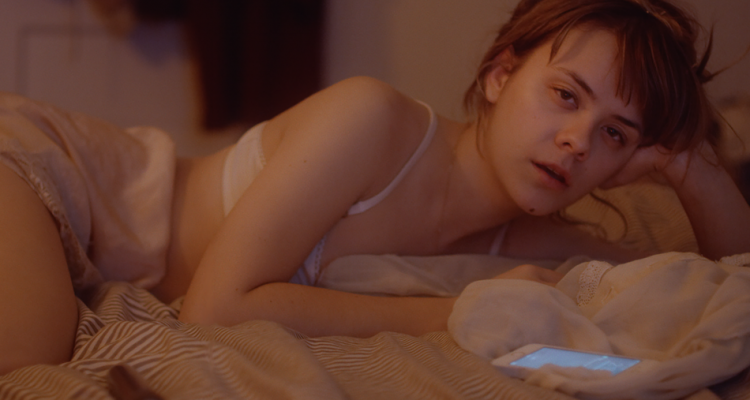If there’s one thing millennials are more obsessed with than social media, selfies and irreverent art, it’s ourselves. Occasionally we find an excuse to bring all four together, as Molly Soda does in her performance artwork, Matt Spicer managed with “Ingrid Goes West,” and now Eugene Kotlyarenko has succeeded in his latest directorial effort “Wobble Palace.” The feature follows a disintegrating relationship on Halloween weekend 2016, right before the most traumatic Presidential election of all time.
A hastily-shown text history gives us the rundown on the couple in question: Jane (Dasha Nekrasova) and Eugene (Kotlyarenko) met, fell in love, moved in together, and now hate each other. They’ve agreed to split their house for a weekend and see how it goes. The kitschy Chinatown space, brilliantly designed by Joan Howard Lee, is a character unto itself. We’re introduced to it, from Windows 98-print curtains to Astroturf carpet, as Jane makes her hasty exit.
As soon as Jane leaves, Eugene gleefully hunts for women on social media. Over the course of the Saturday, he has several unsuccessful encounters via apps like Tinder and Instagram. One woman, Caroline (Paige Elkington) takes nude photos of him and then bails. Sardonic Logan (Janiva Ellis) schools Eugene on gentrification (“I’ve thought about this stuff before, but never in like, the context of me,” Eugene wonders aloud. Her flat reply: “I know”). Eugene becomes more unhinged as the day wears on, even going off on a patented answer-me-bitch rant when a Tinder match leaves him hanging. Despite it all, Eugene regularly insists that his open relationship with Jane is “progressive,” and that he is a “nice guy.”
After taking flack for his man-bun combover, Eugene live-streams an unsettling haircut until his phone’s battery runs out. Exhausted from a booty call with friend Desi (Caroline Hebert), Eugene falls asleep on the toilet, head half-shaved and phone charging. That’s how Jane finds him on Sunday, when she tries to bring home Ravi (Vishwam Velandy). Jane shoos Ravi away, taking a few extra hours to expel Eugene and hang out with her gay best friend Marcello (Elisha Drons). Together, they address Jane’s most dire crisis – another artist calling her “basic” – and go for a driving lesson. Once Ravi returns, he and Jane have sex on every surface of the apartment before Jane, grossed out by Ravi’s support of Trump and inability to pull out, demands he leave once again.
Each character’s day takes up half the movie, with flashbacks of the couple peppered throughout. Even in retrospect, Jane and Eugene are hardly likable, as Jane completely cuts herself off from Eugene and Eugene responds with bursts of affection and condescension. You don’t end up learning much about either person, aside from the self-absorption and insecurity they play out like a Jekyll-and-Hyde routine, but you don’t really want to. Their characters are disturbingly spot-on, if slightly niche. If you went to a liberal arts college or live in a hip area, you have met both these people: Eugene, the terrifying misogynist masquerading as a quirky hipster; and Jane, the hot-yet-narcissistic, “bi-curious” performance artist who hates herself enough to date a guy like Eugene.
Even if you can barely stomach its protagonists, a calling card of Kotlyarenko’s tart work as evinced in his last film, the deeply insufferable “A Wonderful Cloud,” it’s hard not to fall for “Wobble Palace.” At odds with its over-the-top eccentricity, this is a deliberate film that perfectly reproduces a subculture, both visually and narratively. Its aesthetic evokes modern kitsch geniuses like Alex Da Corte and Anna Biller, while its script is so quotable it could fill an entire review. And although hardly tolerable, Jane and Eugene have moments of humanity that you’ll find yourself imbibing like water in a desert: it’s sweet to see the two speak Russian to each other, or to witness their sweet relief at the film’s finale. Dasha Nekrasova is especially winsome as Jane, who’s both so beautiful and so repulsive you can’t help but be intrigued.
“Wobble Palace” is as genius as it is unique, but it suffers one fatal flaw. When writer-director Kotlyarenko satirizes the artsy soft boy type, he seems to be irony-ifying his own misogyny. Said misogyny has its fingerprints all over pornified Jane, who the camera often caresses. Though she’s a caricature, Jane is still pretty believable as a human woman – until Kotlyarenko tries to pass her off as the kind of person who sucks her thumb while masturbating. These objectifying moments are blessedly rare, and Jane remains mostly grounded, probably thanks to Nekrasova’s part in the story-writing process.
When all’s said and done, “Wobble Palace” is trying so hard you can’t help but like it. It brings the kind of first-feature originality that film festivals exist for, and it hardly squanders a second of its scant 83-minute runtime. All signs point to a bright future for triple-threat Kotlyarenko, if he can keep his obnoxious characters in check, and hopefully continue to co-write with women. [B]
Click here for all our coverage from the 2018 SXSW Film Festival.

